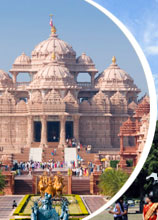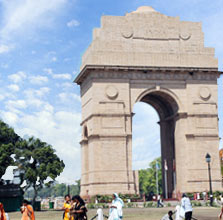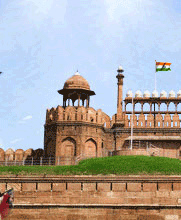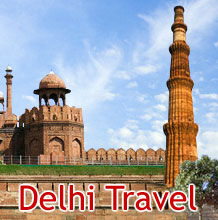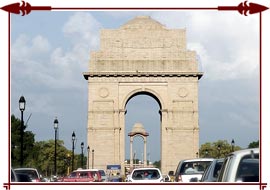 India
Gate is a war memorial of martyred soldiers, situated in the middle of
New Delhi. Standing tall at a height of 42 m, Delhi India Gate, an "Arc-de-Triomphe",
seems like a gateway at the heart of a crossroad. His Royal Highness,
the Duke of Connaught laid the foundation stone of India Gate in the
year 1921. Designed by Edwin Lutyens, the monument was dedicated to the
country after 10 years, by the then Viceroy, Lord Irwin. It stands as a
tribute to the 70,000 Indian soldiers who lost their lives during World
War I, when they fought for the British Army.
India
Gate is a war memorial of martyred soldiers, situated in the middle of
New Delhi. Standing tall at a height of 42 m, Delhi India Gate, an "Arc-de-Triomphe",
seems like a gateway at the heart of a crossroad. His Royal Highness,
the Duke of Connaught laid the foundation stone of India Gate in the
year 1921. Designed by Edwin Lutyens, the monument was dedicated to the
country after 10 years, by the then Viceroy, Lord Irwin. It stands as a
tribute to the 70,000 Indian soldiers who lost their lives during World
War I, when they fought for the British Army. More than 13,516 British and Indian soldiers who got killed in the Northwestern Frontier in the Afghan war of 1919 have their names written on the Indian Gate of New Delhi. After India became independent, another memorial, Amar Jawan Jyoti was added to the existing structure. This arched memorial has an eternal flame that burns day and night as a mark of respect to the soldiers who laid down their lives in the India-Pakistan War that took place in December 1971.
Resting on a low foundation of red Bharatpur stone, the arch rises in stages to a huge molding. On both the sides of the arch the word INDIA is inscribed, along with the date, MCMXIV (1914) on the left and MCMXIX (1919) on the right. The best time to see Delhi India Gate is during nightfall, when it is magnificently floodlit. Splendid lawns, with a number of fountains, encircle the monument. These fountains present a breathtaking view at night when they make a lovely display with colored lights.

